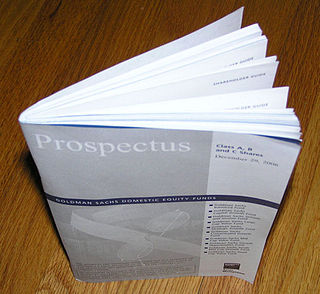The primary market is the part of the capital market that deals with the issuance and sale of equity-backed securities to investors directly by the issuer. Investor buy securities that were never traded before. Primary markets create long term instruments through which corporate entities raise funds from the capital market. It is also known as the New Issue Market (NIM).
Initial public offering (IPO) or stock market launch is a type of public offering in which shares of a company are sold to institutional investors and usually also retail (individual) investors; an IPO is underwritten by one or more investment banks, who also arrange for the shares to be listed on one or more stock exchanges. Through this process, colloquially known as floating, or going public, a privately held company is transformed into a public company. Initial public offerings can be used: to raise new equity capital for the company concerned; to monetize the investments of private shareholders such as company founders or private equity investors; and to enable easy trading of existing holdings or future capital raising by becoming publicly traded enterprises.

The Securities Act of 1933, also known as the 1933 Act, the Securities Act, the Truth in Securities Act, the Federal Securities Act, and the '33 Act, was enacted by the United States Congress on May 27, 1933, during the Great Depression, after the stock market crash of 1929. Legislated pursuant to the Interstate Commerce Clause of the Constitution, it requires every offer or sale of securities that uses the means and instrumentalities of interstate commerce to be registered with the SEC pursuant to the 1933 Act, unless an exemption from registration exists under the law. The term "means and instrumentalities of interstate commerce" is extremely broad and it is virtually impossible to avoid the operation of the statute by attempting to offer or sell a security without using an "instrumentality" of interstate commerce. Any use of a telephone, for example, or the mails would probably be enough to subject the transaction to the statute.
Om is a sacred syllable of Hinduism. The syllable Om is also referred to as Omkara.

An indenture is a legal contract that reflects or covers a debt or purchase obligation. It specifically refers to two types of practices: in historical usage, an indentured servant status, and in modern usage, it is an instrument used for commercial debt or real estate transaction.
Shelf registration, shelf offering, or shelf prospectus is a type of public offering where certain issuers are allowed to offer and sell securities to the public without a separate prospectus for each act of offering and without the issue of further prospectus. Instead, there is a single prospectus for multiple, undefined future offerings. The prospectus may be used to offer securities for up to several years after its publication. A shelf registration statement is a filing with the SEC to register a public offering, usually where there is no present intention to immediately sell all the securities being registered. A shelf registration statement permits multiple offerings based on the same registration. Shelf registration is mostly used for sales of new securities by the issuer, although it might possibly be used for resales of outstanding securities or a combination of both.

A rights issue or rights offer is a dividend of subscription rights to buy additional securities in a company made to the company's existing security holders. When the rights are for equity securities, such as shares, in a public company, it is a non-dilutive(can be dilutive) pro rata way to raise capital. Rights issues are typically sold via a prospectus or prospectus supplement. With the issued rights, existing security-holders have the privilege to buy a specified number of new securities from the issuer at a specified price within a subscription period. In a public company, a rights issue is a form of public offering.
A securities offering is a discrete round of investment, by which a business or other enterprise raises money to fund operations, expansion, a capital project, an acquisition, or some other business purpose.
A bought deal is financial underwriting contract often associated with an Initial Public Offering or public offering. It occurs when an underwriter, such as an investment bank or a syndicate, purchases securities from an issuer before a preliminary prospectus is filed. The underwriter acts as principal rather than agent and thus actually "goes long" in the security. The bank negotiates a price with the issuer.
A red herring prospectus, as a first or preliminary prospectus, is a document submitted by a company (issuer) as part of a public offering of securities. Most frequently associated with an initial public offering (IPO), this document, like the previously submitted Form S-1 registration statement, must be filed with the Securities and Exchange Commission (SEC).
Form S-1 is an SEC filing used by companies planning on going public to register their securities with the U.S. Securities and Exchange Commission (SEC) as the "registration statement by the Securities Act of 1933". The S-1 contains the basic business and financial information on an issuer with respect to a specific securities offering. Investors may use the prospectus to consider the merits of an offering and make educated investment decisions. A prospectus is one of the main documents used by an investor to research a company prior to an initial public offering (IPO). Other less detailed registration forms, such as Form S-3 may be used for certain registrations.
A Direct Public Offering (DPO) is a method by which a business can offer an investment opportunity directly to the public.
A venture round is a type of funding round used for venture capital financing, by which startup companies obtain investment, generally from venture capitalists and other institutional investors. The availability of venture funding is among the primary stimuli for the development of new companies and technologies.
The Australian Small Scale Offerings Board (ASSOB) is a crowdfunding facility for small businesses in Australia to raise equity finance. It differs from the Australian Stock Exchange (ASX) and the National Stock Exchange in a few key ways:
- Most capital raisings on ASSOB occur under the provisions of section 708 of the Corporations Act
- While ASSOB has a secondary market, it is not an exchange with active market-makers constantly buying and selling shares
- Listing costs and compliance costs are substantially reduced
A public offering is the offering of securities of a company or a similar corporation to the public. Generally, the securities are to be listed on a stock exchange. In most jurisdictions, a public offering requires the issuing company to publish a prospectus detailing the terms and rights attached to the offered security, as well as information on the company itself and its finances. Many other regulatory requirements surround any public offering and they vary according to jurisdiction.
Regulation S-K is a prescribed regulation under the US Securities Act of 1933 that lays out reporting requirements for various SEC filings used by public companies. Companies are also often called issuers, filers or registrants.
Securities regulation in Canada is conducted by the various provincial securities commissions and self-regulating organizations (“SRO”) such as the MFDA and IIROC. Securities are issued under the authority and oversight of these bodies with the result that a broad range of rules apply to companies seeking to raise capital and to the parties acting as their agents in such transactions. However, there is a useful simplification that can be applied in Canada to provide some clarity for issuers - based on the criteria below securities issuers fall into two broad categories:
The Listing Rules (LR) are a set of regulations applicable to any company listed on a United Kingdom stock exchange, subject to the oversight of the UK Listing Authority (UKLA). The Listing Rules set out mandatory standards for any company wishing to list its shares or securities for sale to the public, including principles on executive pay and the requirement to comply or explain noncompliance with the UK Corporate Governance Code, the requirements of information in a prospectus before an initial public offering of shares, new share offers, rights issues, disclosure of price sensitive information, or takeover bids for companies.
Following is a glossary of stock market terms.





